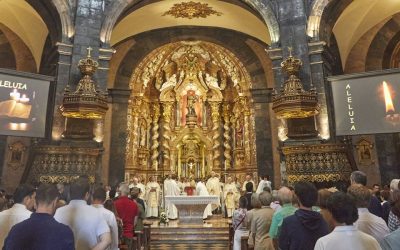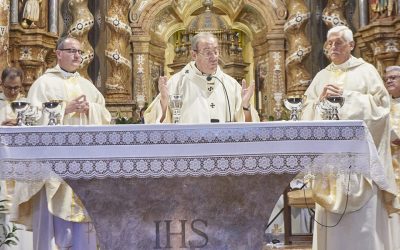During this Ignatian Year, we are publishing a series of homilies that Fr. General Kolvenbach held on the feast days of St. Ignatius. In this first homily, Fr. Kolvenbach focuses on Ignatius’ passion for the Church which was going through difficult times.
Church of the St. Ignatius Rome, July 31st 1993
Here we are together again in the church of Saint Ignatius, because he was able to incarnate in his person the words of the Gospel which invite men and women to follow Jesus losing their own life to find it, to find true life, in Jesus forever. Generously, Saint Ignatius did not fulfil Jesus’ words in a private life of his own for he could not conceive himself as a person outside the ecclesial communion, outside the Church. When he wrote about the Church he never failed to see her in her reality of Jesus’ Spouse, who lives with her Lord, her Spouse, a mystery of love. Thus, for Ignatius, losing one’s own life in order to follow Jesus signified renouncing his own projects and ideas in order to place his whole heart at the service of the Church, Jesus’ spouse. Ignatius lost his life for a Church which, born of the wound in the Lord’s side, can only be his spouse through sharing his passion and his cross in order to give the world the true Life -her Spouse. In this spirit, Ignatius did not want the Society of Jesus to work for its own progress and well-being but to commit itself exclusively to the projects and missions the Church was to entrust it with through the calls of the Vicar of Christ on earth.
But for Ignatius, losing one’s life to follow Jesus in his Church also had another, diversely painful, sense. Like us, Ignatius had suffered the crucifying experience that the more a member of the faithful loves the Church, the more he will suffer from its weaknesses and deficiencies, from its errors and scandals. Love for the Church makes us dream of an ideal Church, without spot or wrinkle or anything of the kind, and awakens in us an ardent zeal for the purity of Jesus’ Spouse. Though he lived at a time when the Church had a very great need for reform “above and below”, Ignatius did not withdraw into an attitude of subtle criticism, into sharp and always negative attacks. Though he was aware – for his eyes were open – of the obscure reality of the Church of his time, he lovingly set to work to reform his own self by following Jesus ever more closely and to help all those whom the Lord put along his path in seriously reforming themselves, thus building up the holy city with the living stones of the Lord’s passion for his Spouse, the Church.
Ignatius did not place himself outside the Church or next to the Church simply because she was not the Church of pure love, of pure spirit. Convinced that following the Lord is never authentic without also loving his “Spouse who is the Church” and painfully suffering on account of the all too human reality of the Lord’s assembly, Ignatius identified with her as she is on the Lord’s part and how she is on the part of us poor sinners. It is precisely as a man of the Church that Ignatius learnt to lose his life and divest himself of the honour of belonging to an irreproachable and perfect community of faith in order to love a Church which, composed as it is of saints and sinners, of strong and weak people, laboriously and patiently advances through the darkness of this world she confronts, towards the eternal light which is her Spouse. For Ignatius, following Jesus meant losing his own life for a Church which here and there was disfigured or rejected. He had learnt from his Lord that for the Church too there is no other way than the way of the cross, and that refusing to suffer for the Church and because of the Church is, all things considered, retreating in front of the cross. May this Eucharistic celebration obtain something for us of Ignatius’ passion for the Church, which the Groom wanted entirely resplendent, holy and immaculate.








